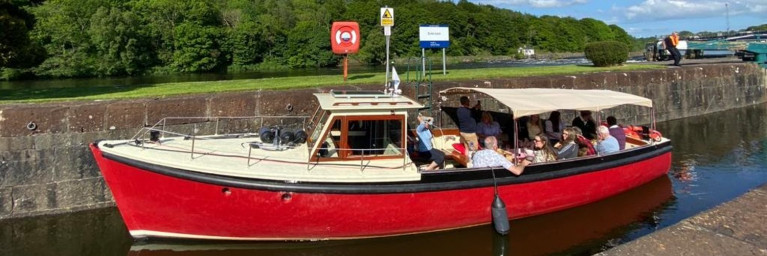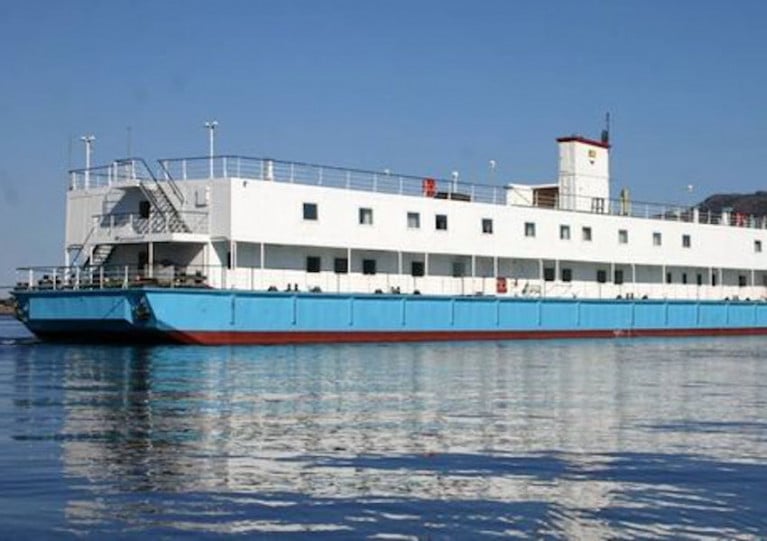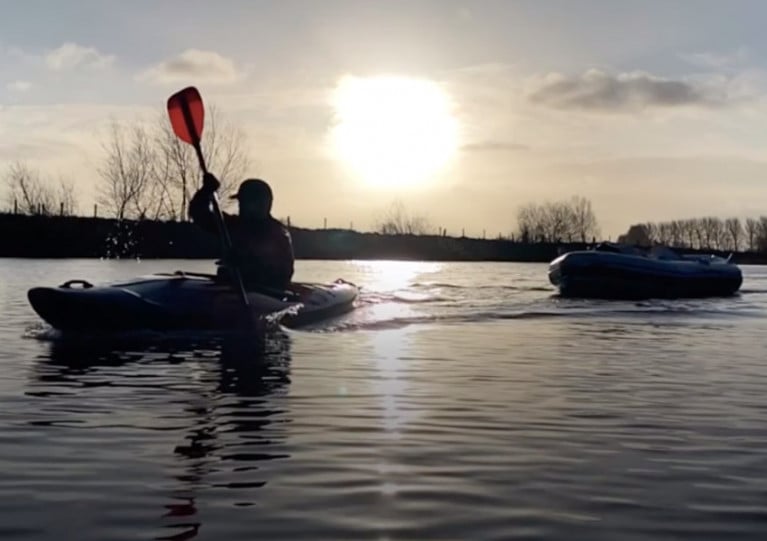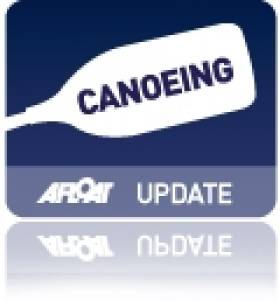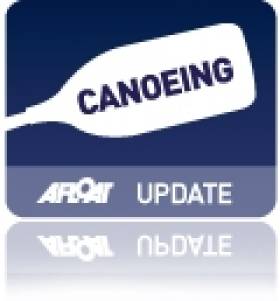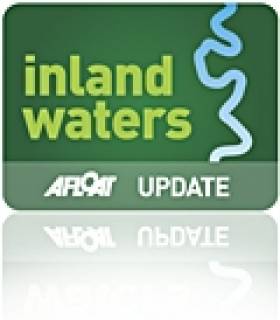Displaying items by tag: River Bann
PSNI Officers Rescue Kayakers From Strong Tide in River Bann
Police officers in Coleraine have been praised after their rescue of two kayakers from the River Bann in Northern Ireland earlier this week.
Dog walkers noticed the kayakers had gotten into difficulty in the river at around 6.20pm on Tuesday 9 January. They called 999 and multiple emergency and voluntary services were dispatched to the area.
PSNI officers were the first emergency responders on the scene and found the kayakers clinging to branches after being caught in an unexpectedly strong tide.
Two officers entered the cold water and, with the assistance of colleagues on the riverbank, were able to bring the men safely to waiting ambulances which took them to hospital for treatment.
Speaking to BBC News NI, Superintendent Mark Roberts said: “The change in the current was so strong, one of the kayaks was swept away, leaving a gentleman clinging to a tree and another one just standing in the water off the bank.”
Both kayakers were taken to Causeway Hospital in Coleraine for treatment after their ordeal.
Chief Inspector Vince Redmond commented: “I am delighted that these men were brought to safety, and that our officers showed such resourcefulness, skill and courage.
“Their work on Tuesday evening was the embodiment of ‘keeping people safe’ in our community.
“This was a fantastic example of collaborative working with our colleagues from Northern Ireland Ambulance Service, Northern Ireland Fire and Rescue Service and the indispensable volunteers of Community Rescue Service. There’s no doubt in my mind that lives were saved as a result.”
Warning Over High Water Levels on Inland Waterways
Waterways Ireland advises all masters of vessels and water users that the Shannon Navigation, Erne System, Barrow Navigation and Northern Ireland’s River Bann are currently experiencing high water levels which are expected to continue to rise.
All users of these inland waterways should proceed with additional caution and bear the following in mind:
- Air draft is reduced under all bridges and power lines.
- Water velocity is significantly increased.
- Access to jetties can be difficult as gangways and pontoons are elevated.
- Navigation markers, pontoons, jetties may be submerged.
- Mooring lines should checked regularly if it safe to do so.
An inaugural voyage of the 'Meander and Dander', a new tourism offering from White River Charters, took place on the river Bann on Tuesday 26th April.
Invited guests and visitors enjoyed the beautiful spring conditions onboard M.V. Kingfisher, a unique 75-year-old wooden motor vessel, built by shipyard Harland and Wolff and beautifully restored by business partners Fiona Bryant and Ian McKnight during the Covid pandemic.
The fully guided heritage journey retraces the voyages of the stone age hunter-gatherers who explored, hunted, and fished the River Bann and tells the fascinating origins story of human settlement in Ireland and how the river and Mountsandel are at its heart.
From the marina in Coleraine, visitors were treated to a slow and gentle cruise downstream into the Bann Estuary Area of Special Science interest (ASSI), where they were rewarded with views of the wonderful estuarine and coastal scenery, ancient sand dunes and various habitats before turning and navigating upstream towards Mountsandel.
More on the Causeway Coast Community website.
Plans for Ireland’s First Floating Hotel Get Go-Ahead
The green light has been given to Ireland’s first floating hotel, as BreakingNews.ie reports.
In May last year Afloat.ie carried news of the proposals to bring a 70m barge to the Lower Bann at Crannagh Marina in Coleraine, Northern Ireland.
Seamus Carey, owner of the Crannagh Complex, said he was motivated by a “surge” in visitor numbers to his marina before the first COVID-19 lockdown — as well as his disappointment in losing a Mississippi-style paddle steamer that he had first intended as an attraction.
Now Carey has expressed his delight at planners’ approval to moor the barge, which would be fitted out as a four-star hotel with 36 en-suites as well as facilities for dining and functions.
BreakingNews.ie has more on the story HERE.
River Bann Could Host Ireland’s First Floating Hotel
Two years after his dream of a riverboat barge on the River Bann was lost to the Irish Sea, a Northern Ireland marina owner is making plans for Ireland’s first floating hotel, as Belfast Live reports.
Seamus Carey, who owns the Cranagh Marina Complex, has filed a planning application for a 70-metre barge he’s found in Norway which he intends to renovate into three-star accommodation with 36 cabins, a restaurant and function room.
He said “surge” in visitor numbers at his marina complex before the Covid-19 lockdown moved him to reflect his plans — which initially sank with the loss of the Mississippi-style paddle steamer MV Oliver Cromwell off the North Wales coast in May 2018.
Belfast Live has more on the story HERE.
Portadown Man’s Crusade To Clean River Bann By Kayak
It started in August last year when Northern Ireland man Jon Medlow noticed the amount of rubbish floating downstream while kayaking in the River Bann near Portadown.
Just a few months later, as BBC News reports, and he’s removed almost 9,000 bottles from the waterway — besides hundreds of discarded footballs, and enough refuse to fill close to 70 bin bags.
The sheer amount of waste even prompted Medlow to purchase a dinghy which he tows behind his kayak to carry the rubbish he collects — and his one-man initiative has now won support from the local council.
BBC News has much more on the story HERE.
Larne Women To Paddle The Ban for Cancer Charity
#Canoeing - Larne women will be paddling the Bann this April all in the aid of a very good cause.
The 24-strong group from local fitness club BeFit, going by the title of the BeFit Challengers, will take to the water on 20 April for the start of a two-day canoeing expedition, along the River Bann and out to the Atlantic.
As the Larne Times reports, these ladies hope the challenge - and an epic mountain cycling event later in the year - will raise funds for Cancer Focus Northern Ireland.
BeFit owner Andrea Kernohan said: “I like to set the BeFit girls a challenge every so often, so that they have a fitness gold to work towards. I thought these Cancer Focus challenge events were perfect.
"Sadly this cause is close to mine and the girls’ hearts as so many people have been affected by cancer in one way or another.”
The Larne Times has more on the story HERE.
Canoeing and Camping on the River Bann in Aid of Cancer Charity
#CANOEING - The Coleraine Times reports that a fleet of canoes will 'Paddle the Bann' in a two-day charity challenge from 26-27 May.
Participants will be canoeing and camping on the River Bann some 60km downstream as far as Coleraine in aid of the Ulster Cancer Foundation, which supports local cancer patients and their families.
Sarah Atcheson from the charity said: “This is a unique and wonderful way to experience beautiful Irish countryside and meet new people, while raising funds for local people who have been affected by cancer.
“No previous canoeing experience is necessary as training will be provided and participants will be under the supervision of qualified staff at all times."
Registration is £25 - which covers tents, camping equipment and canoe usage - and all those taking part are asked to raise a minimum of £225 in sponsorship. Participants will be paddling in two-man Canadian canoes, but it's not required to register as a team.
The Coleraine Times has more on the story HERE.
Carrickcraft Launches New Holidays on Lower Bann
Ireland's largest cruiser hire company is set to move into waterways north of the border next year.
Carrickcraft – which for 30 years has provided cruising holidays on the Shannon and the Erne - has plans to operate a small fleet of hire-boats on the Lower Bann in 2012.
The company will initially operate three Kilkenny Class cruisers (2 + 4 berth) and three Carlow Class cruisers (2 + 2 berth) from new pontoons at Coleraine Town Centre Marina.
According to Carrickcraft, a seven-day holiday on the Bann would allow travellers to see all of the river and have some extra time to discover the hinterland.
Carrickcraft MD John Morton said: “We are delighted to be able to open a fourth Irish base and to bring more tourists to the region. We are fully committed to the project and hope to increase the fleet size in the future.
"Having travelled along the Lower Bann myself, it is great to be able to open up such a wonderful waterway to a larger public.”
The first boats will arrive early in the New Year ahead of the summer season from March to October 2012.
For booking enquiries contact the sales office at 028 3834 4993. For more details visit www.cruise-ireland.com.


























